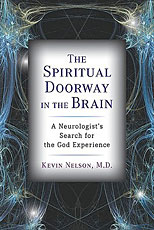"We may be embarrassed about our spiritual experiences. But we remember them. We don't know what they mean; we find it hard even to begin to describe them. And when a researcher such as myself looks at the broad range of spiritual experiences in the human population, a great diversity appears. A person may be engaged in almost anything when the apparently divine comes to visit. Certainly the four properties of mystical experience that James [William James, author of The Varieties of Religious Experience] identified are typically present, but some people who confront acute danger and medical crisis have a near-death experience and Jesus pops up on the end of the bed. Sometimes spiritual experiences are provoked by fear without any actual physical trauma or event. As we'll see, the spiritual can be found in seizures, hallucinations, psychotic states, drug experiences.
"When some perhaps less traditionally religious people speak of the spiritual, they describe achieving a 'higher' or transcendent consciousness. And just about everyone agrees consciousness is what makes a brain a brain. For neurologists, consciousness has a specific meaning, and it is identified with processes that have specific signatures in the brain. Indeed there have been dramatic recent advances in our understanding of how consciousness comes to exist and function. It now seems reasonable to expect that new knowledge will illuminate the mysterious nature of spiritual experiences to an extent James could not have imagined. James considered Symonds's trance 'beyond anything known in ordinary consciousness.' We certainly know more about the brain machinery of consciousness than about spiritual experience. Perhaps spiritual experience uses the same brain mechanisms that bring us consciousness — but uses them in a different way."
